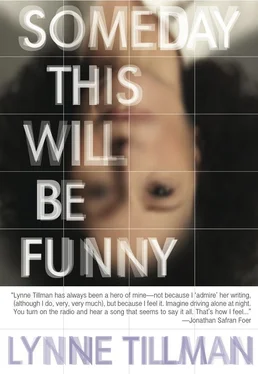Lynne Tillman
Someday This Will Be Funny
That’s How Wrong My Love Is
A while back, I watched a pair of mourning doves in their nest every day, watched as one then the other sat on an egg; saw their baby emerge from the egg, watched its being carried food and fed, saw them all fly away one late summer morning, never to return, I thought. But there are many mourning doves around my neighborhood and maybe those three are back.
Every morning, right to the window; every afternoon, come home, open the door, right to the window — I witnessed the entire cycle of a nesting mother and father, a chick’s beak cracking through the eggshell, the baby’s care, its parents’ nurturing it, the baby’s first flight.
The mother and father took turns sitting on the egg, and I was informed by a genuine birder, a nature writer, that this behavior was unexpected and unusual. One bird sits, the other flies away and returns with food, the sitter flies off, then the food gatherer guards the egg, mother and father switching roles to protect the egg, that was unusual, I was told.
The nest rested in an empty planter on a windowsill on another building directly across from my window; I strained to see it, a city backyard away. I thought about getting a telescope, but in the city — remember Rear Window —that can be dangerous or at least provocative. I would have to train my sights carefully and somehow declare my looking benign, when most looking is not. As far as I know there is no gesture, like waving a white flag, to signify a lack of aggression in looking. As for the people whose window it was, and whose planter it was, I never met them, or saw them at the small window, and I often wondered how they felt about the avian family on their ledge. After the birds left, the planter was quickly filled with flowers, so I understood that they disliked the birds’ nesting at their window. I disliked them for that, since mourning doves are supposed to return to their nests, and now they couldn’t. This might sound strange to non-New Yorkers, but many backyards of smaller apartment buildings are quiet, untrafficked, almost bucolic settings. It’s quiet and calm behind many buildings, which are not in midtown, and perfect for birds.
I read about mourning doves’ habits and that the males have red streaks on their necks, while the females don’t; still, I couldn’t tell one sex from the other. Rising in the morning and rushing to the window, cup of tea in hand, I’d make sounds I hoped they’d associate with me, friendly noises, but I was never certain that they were, or if they might be inimical in their language. I was sure, though, they noticed when I whistled or cooed.
Mourning doves have a distinctive call, a melancholy coo, melodic and even hypnotic. Curiously, the voice doesn’t seem to come from them, their beaks don’t look open. But if you get close enough to them, you’ll notice that the feathers on the necks fluff out, and their little chests puff out and vibrate. A dove’s coo is in the lower range, there are usually four or five calls in a row, sweetly mournful, though what they are mourning can only be supposed. I like their sound, though if they carried on day and night, I’d go crazy.
The reason I imagine they looked at me or in my direction, though what image they saw is a mystery, was confirmed on a special, sad morning. As usual, I made myself a cup of tea, and, cup in hand, went to the window to see the birds and the nest. They weren’t there. The nest was empty. It was terrible. I gave my cry and whistled, and immediately I heard a rustling noise. I looked to my left, and there were the three birds, sitting on the bough of a big, New York weed tree.
This is what happened: I whistled again, the three gazed at me, now closer in proximity than they’d ever been, the baby half the size of its parents, so slim and sleek, and with their heads turned in my direction, there was a long moment during which we continued to look at each other. Then, suddenly, but in unison, they flew away. They’d waited for me to come to the window, they’d wanted me to know they were abandoning their nest. And me, perhaps.
I realize this sounds corny, ridiculous, or just another piece of anthropomorphism, or vanity, if feeling appreciated or recognized by birds is vanity. Yet I believe it was their intention, though I have since learned that mourning doves lack cunning and are not bright.
Not long ago, I saw a documentary about many varieties of migratory birds— Migration —who fly thousands of miles twice a year for food and a safe place to nest, raise their chicks, and return when the elements change; their lives are full of duress and hard work. They have little rest. While the airplane with the cinematographers flew beside the flock, the birds ignored it and singlemindedly moved forward, their wings beating rhythmically and constantly, though occasionally they glided, and they might have been exhausted; yet they kept going, determined to eat, to nest, to procreate. While the film’s angles were gorgeous, and I did feel as if I were in the sky beside the birds, I had the beginnings of vertigo and was disturbed almost all the way through. I thought, their travails necessitated small, light brains; otherwise, with heavier, big brains, how could they manage flight and why would they go on living like that? If they could think, they might think, as many humans do, life is meaningless if all I do is fly back and forth.
The next spring, with the planter full of flowers, no birds nested across the backyard. But one day, I don’t remember when, a mourning dove appeared on the fire escape at the front of our apartment, four stories up. I wondered if it was one of the three. I bought birdseed and began putting it out on the window ledge. I made the whistling and cooing sounds I did for the first family, and that bird or another and others began showing up. I also hung a birdseed feeder for finches, and they came within a week, but with five or six on the feeder, the feeder shook so much, the seed landed on the sidewalk, and hundreds of pigeons took up residence and shitted all over it. I love finches, their brilliant and subtle coloring, their tiny rounded chests, but I had to remove the feeder, or become another character on the block who caused a nuisance.
In my building there is a young woman who cannot throw out anything; she appears normal, whatever that is, but if you went into her apartment, which I was forced to do one day, to search for my absent-minded, runaway cat, Louis, the madness of her place — moth-eaten, worm-ridden, filthy rugs piled high upon a moldy couch, nearly to the ceiling; a sole, scraggly path through the apartment, between boxes and mounds of junk, probably teeming with vermin; shelves and lamps leaning against other furniture, so if one object was moved, everything would fall down — this chaos describes a very different person from the bubbly young woman who zips happily around the neighborhood. Inside her apartment that one time, I recognized some of the pieces I had thrown out years ago. She’s a hoarder, a photographer, who shoots me when I don’t know she’s there, gleefully catching me unaware, and also a fire hazard but none of us tenants would dare tell her to examine or change her ways. Occasionally I see her daintily dropping a tiny bundle of trash into the building’s garbage can.
I’ve been leaving seed on the ledge for about five years, and there are mourning doves who appear every day at the same time, morning and late afternoon, but I’ve given up trying to distinguish one from the other. Sometimes I think I can recognize them by their intelligence, but I can’t really. I signal, and one, two, or three might fly to the fire escape and watch as I shovel out the seed. Some are not afraid anymore; I think they’re the smart ones, they move closer to the ledge, to the seed. Some show fear and fly off; the dumb ones, even if they stay, never touch the food, even when they see it, and then many pigeons — mourning doves are in their family but pigeons are ugly and twice their size — congregate and greedily consume all of the seed.
Читать дальше












